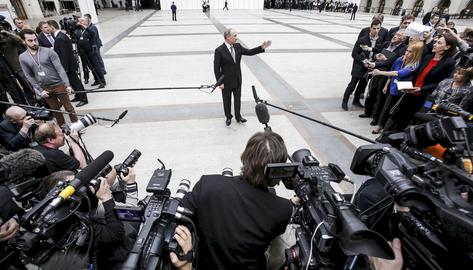To mark International Day of Families on Friday, May 15, jurist and Iranian presidential advisor Shahindokht Molaverdi took to her Telegram channel, writing: "The structure of the family has changed in recent decades, but the United Nations still considers the family the principal unit of society.
“This year, given the outbreak of coronavirus, the emphasis is on the importance of investing in social policies in crisis to support the vulnerable families."
To illustrate the point, Molaverdi, who served as vice president for women and family affairs in President Rouhani's first cabinet and is now his special assistant for citizenship rights, shared a graphic produced by the United Nations. It depicted various examples of “family units”: a man and a woman, two men, and two women, with children. This graphic signified the UN’s recognition of same-sex marriage.
On publishing this post, Molaverdi faced a barrage of criticism from hardline social media users, critics of Rouhani's government and religious extremists who accused her of promoting homosexuality. It led to her deleting the post, but screenshots of it have been widely shared across a number of virtual networks, especially Twitter, along with the incendiary hashtag ‘#trial’. Among these hardline users were those trained by the government itself to promote the ideals and values of the Islamic Republic.
Alireza Zakani, who stood as a candidate in the parliamentary elections this year, tweeted that International Day of Families had "became a means for Mr. Rouhani's advisor, Ms. Molaverdi, to announce the change in family structure by publishing a photo with two homosexual symbols, as different family structures. This moral failure or lacking the least understanding of the family concept, should be condemned by Mr. Rouhani."
Public Discourse is an Unfair Fight
The online castigation of Shahindokht Molaverdi – and her self-censorship – mirror what took place when Mahmoud Karimi, a famous and well-regarded eulogist, described the third Shiite Imam Husayn ibn Ali as a man who used to bet on backgammon games and lose sacks of rice in a religious program broadcast live on Islamic Republic TV. If these remarks had made by someone who not supported by Ayatollah Khamenei's office, Karimi would doubtless have been arrested immediately or at least summoned to court.
In the Islamic Republic of Iran, a tool frequently deployed to eliminate political rivals is holding their spoken or written statements up for contrast with Shiite teachings, and the words of politically sacrosanct figures such as Ayatollah Khomeini or Ali Khamenei. In many cases the undermined parties did not even seek to gain power or status but merely wished to highlight an issue or, as Molaverdi did, reiterate a point.
In Iran the ultimate victor will always be the one with greater sway over the security apparatus, prisons, and the judiciary. In democracies, rivals frequently quote one another in political and partisan rivalries, but because of the existence of an independent and professional judiciary, their opponents are not arrested or imprisoned for commenting. In Iran, an ill-judged comment may even carry a death sentence.
Hashem Aghajari, an Iranian politician who spoke in Iran in the early 2000s about Shiite sources of emulation, was arrested, tried, and sentenced to death for having "insulted Islamic chastity." In the end, execution was not carried out.
Targets Change Over Time
These coercive methods are not a sustainable way to ensure unlimited power in the long term, and the groups targeted change with the political weather. During the leadership of Ayatollah Khomeini, the left-wing politicians of the Islamic Republic and the reformists of the 1980s and 1990s supported him and thus enjoyed relative immunity from right-wing groups. With the beginning of Khamenei's leadership, the situation was reversed, and right-wingers obtained the keys to detention centers and prisons.
There is therefore also no guarantee that the absolute immunity of those around Ayatollah Khamenei will be established after the end of his leadership. In this climate, it is worth asking how a new group of rulers with a different ideology in future might be inclined to treat those who acted with impunity and immunity during the 30 years of Ayatollah Khamenei's leadership.
visit the accountability section
In this section of Iran Wire, you can contact the officials and launch your campaign for various problems

























comments